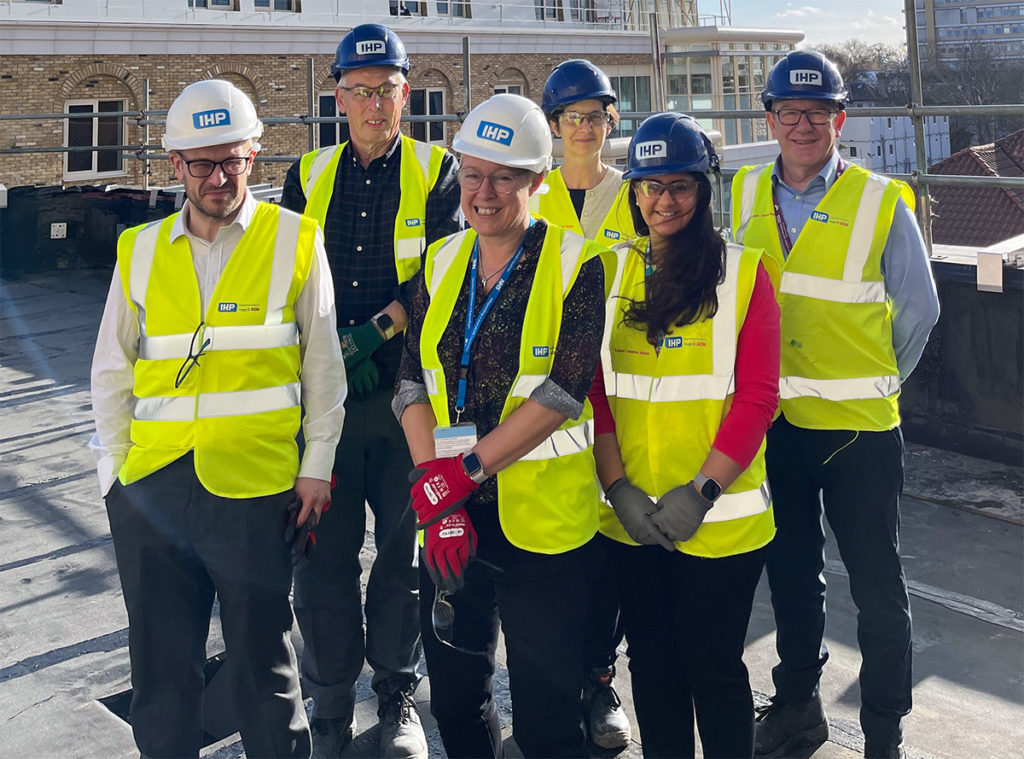New NHS Regional Director learns about south east London’s achievements and ambitions
The new NHS regional director for London saw first-hand key aspects and achievements of healthcare in south east London during a visit shortly before her appointment was confirmed.
Caroline Clarke visited a church in Camberwell to meet several community groups who are key local NHS partners, met staff and service users at a mental health centre and took in the views from the roof of a landmark new building for child and adolescent mental health services and research.
On a visit to the North Living Well Centre in Brixton, she met colleagues from the Living Well Network Alliance and Lambeth Together. The centre is one of three community bases for Lambeth adult mental health services.
Andrew Eyres, Executive Director of Place for Lambeth, said: “Caroline was complimentary about what she saw and heard at the centre and of the Lambeth Together approach as a whole. She said she really enjoyed meeting the team – saying they are a great group of people with such positivity. We discussed the ingredients for successful place-based partnership working and how, through more integrated care, we can improve the service offer to our residents.”
At a Camberwell church Caroline learnt more about South London Listens, a new model for community engagement and co-production in the NHS. Initially driven by the three mental health trusts in south London, it is a partnership of the two south London Integrated Care Boards, 11 local authorities and a number of community organisations – coordinated by Citizens UK.
Speaking after Caroline’s visit, Pete Brierley, Associate Director of Citizens UK, said: “South London Listens is about a fundamentally new way of working between the NHS and communities – developing a true partnership to innovate, organise and share power. We were delighted to spend time with Caroline and show her how this is already changing the lives of people across south London and how they can now influence the work of the local NHS, councils and the voluntary sector.
“Caroline recognised the importance of the work and was pleased that the SEL ICB and their partners are delivering on the commitments they made to communities since the programme was launched in 2020 in response to the pandemic.”
They agreed on the importance of prevention and engaging with communities whose voices are often not heard.
Caroline then took in a bird’s eye view from the roof of the new world-leading Pears Maudsley Centre for Children and Young People at the Maudsley Hospital.

Staff set out the ambitious plans for the Pears Maudsley Centre, the home of the Kings Maudsley Partnership that will bring together South London and the Maudsley’s specialist CAMHS services and Europe’s largest group of mental health scientists, clinical academics and researchers from IoPPN.
Local NHS leaders explained how the centre will help fulfil several of the ICB’s strategic priorities when it opens next year – including that children have a “good start in life” and “improving children and young people’s mental health”.
They also shared updates from colleagues who are co-developing innovative new approaches – including the Community Embedded Worker programme where NHS clinicians are working directly in migrant organisations to tackle barriers to access, such as our work with the Safe Surgeries Network.
Caroline heard that while the South East London Integrated Care System has made significant progress in delegating authority to local partnerships and organisations for planning and delivering health services to local people, this is still ‘a work in progress’. Local leaders told her that as people are not defined by borough boundaries, it will be important to work with all partners to ensure that south east Londoners receive the best possible care.
She was also interested to hear about the early impact of Primary Care Networks (PCNs) in south east London as they are a key building block in the NHS long-term plan.
SEL ICB Chief Executive Officer Andrew Bland said: “It’s tremendous that Caroline is aware of so much of the innovation and improvement taking place across south east London and our drive to work more closely with our communities and partners.
“She saw that PCNs have started to deliver some early wins by bringing general practices together to work in collaboration. The networks of GP practices have helped them recruit and retain staff, provide a wider range of services to patients and improve integration with the wider health and social care system.
“Caroline was positive about the visit throughout as she prepared for – and now starts – her new role. South east London looks forward to welcoming her back soon.”
